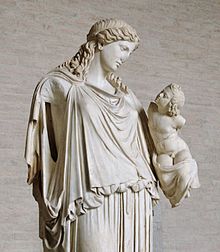This is an old revision of this page, as edited by L'ecrivant (talk | contribs) at 08:20, 9 September 2010 (Spelling error). The present address (URL) is a permanent link to this revision, which may differ significantly from the current revision.
Revision as of 08:20, 9 September 2010 by L'ecrivant (talk | contribs) (Spelling error)(diff) ← Previous revision | Latest revision (diff) | Newer revision → (diff)
Eirene, or Irene (Template:Lang-grc, pronounced IPA: [eiˈrɛːnɛː]; Greek for "peace"; the Roman equivalent was Pax), one of the Horae, was the personification of peace, and was depicted in art as a beautiful young woman carrying a cornucopia, sceptre and a torch or rhyton. She is said sometimes to be the daughter of Zeus and Themis.
She was particularly well regarded by the citizens of Athens. After a naval victory over Sparta in 375 BC, the Athenians established a cult for Eirene, erecting altars to her. They held an annual state sacrifice to her after 371 BC to commemorate the Common Peace of that year and set up a votive statue in her honour in the agora (marketplace) of Athens. The statue was executed in bronze by Cephisodotus the Elder, the father of the famous sculptor Praxiteles. It was acclaimed by the Athenians, who depicted it on vases and coins.
Although the statue is now lost, it was copied in marble by the Romans; one of the best surviving copies (right) is in the Munich Glyptothek. It depicts the goddess carrying a child with her left arm – Ploutus, the god of plenty and son of Demeter, the goddess of agriculture. Eirene's missing right hand once held a sceptre. She is shown gazing maternally at Ploutus, who is looking back at her trustingly. The statue is an allegory for Plenty (Ploutus) prospering under the protection of Peace (Eirene) ; it constituted a public appeal to good sense.
References
- ^ Wünsche, Raimund (2007). Glyptothek, Munich: masterpieces of Greek and Roman sculpture. C.H.Beck. p. 79. ISBN 9783406565083.